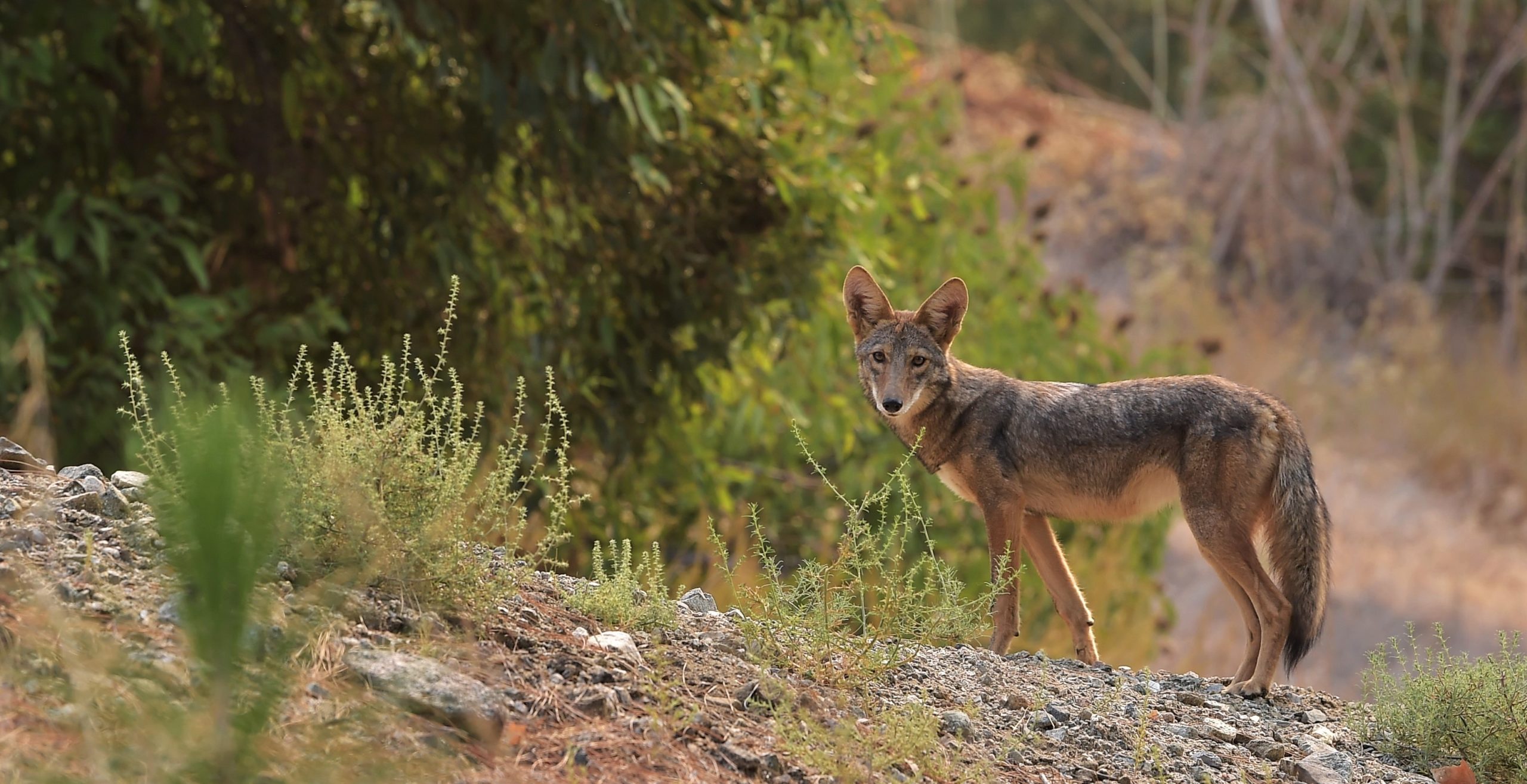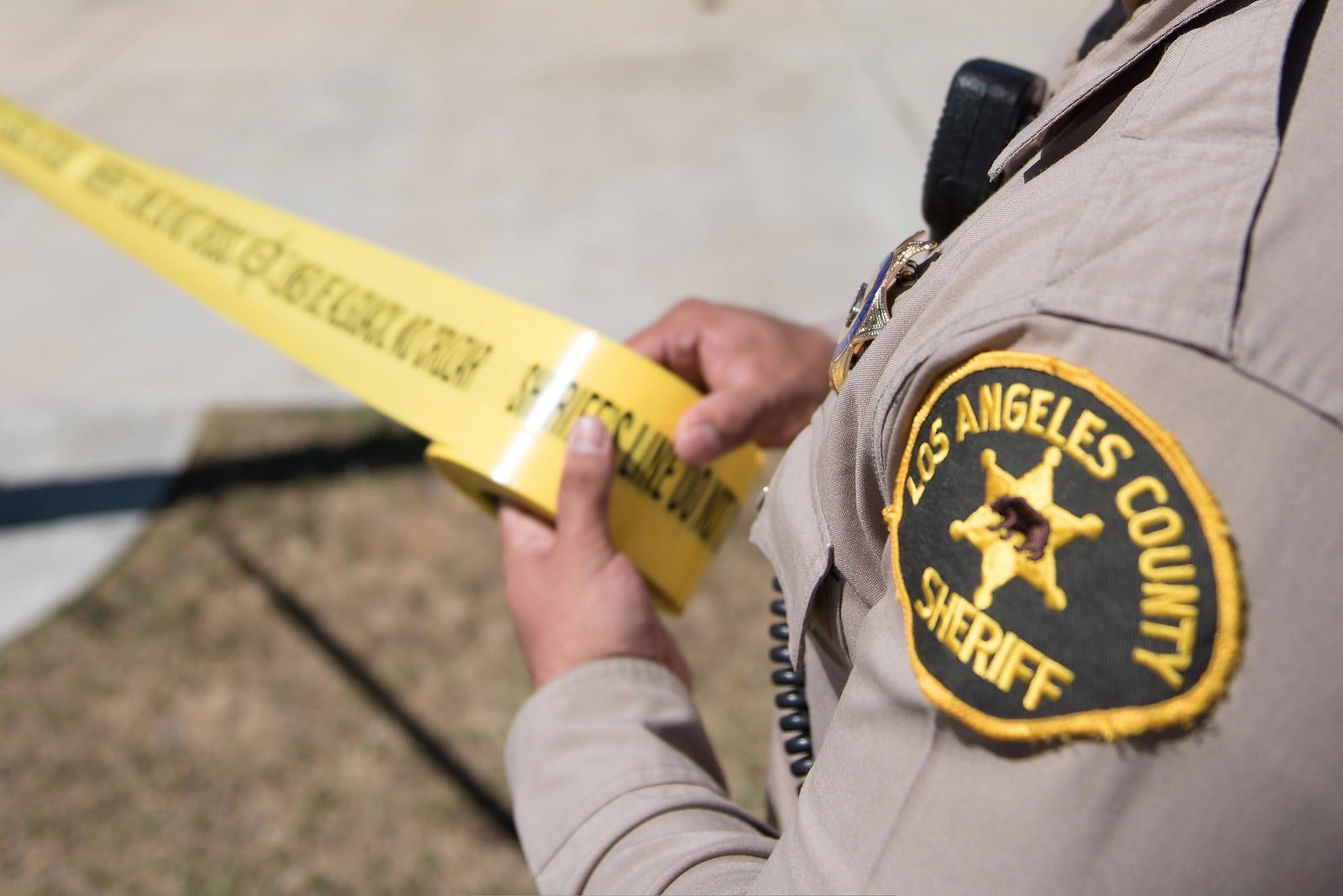Editor’s Note: Some hyperlinks lead to disturbing photos and videos of dead animals from The Humane Society of the United States.
In 2014, the California Fish and Game Commission made California the first state in the nation to take a stand against this blood sport
Hey SoCal recently became aware of groups of men, women, and sometimes children who enter what’s known as “killing contests” where hi-powered, military-type weapons are used to exterminate coyotes, racoons, foxes, squirrels, bob cats or even wolves. The goal is to kill as many animals as possible and win cash prizes from the organizers. Coyotes are the main event, however.
According to the Humane Society of the United States, the practice is legal in 42 states.
Even a cursory look on the internet (YouTube, especially) yielded some disturbing videos such as a smiling 6-year-old using an assault rifle to kill a healthy coyote and high-fiving dad after the kill.
“Killing coyotes will yield you only dead coyotes,” Jill Fritz, Humane Society of the United States senior director of wildlife protection, said in 2018. “It’s killing for the sake of killing, for the fun, for the bragging rights. The amount of visceral hatred for these native carnivores is disturbing.”
Hey SoCal asked Katie Stennes, program manager of wildlife protection for the Humane Society of the United States, about this practice and how the organization is cracking down on the hundreds of illegal contests throughout the United States:
Hey SoCal (HSC): Which are the states most likely to perform these “contests” and how are the participants notified of events in their area?
Katie Stennes (KS): Wildlife killing contests are pervasive across the U.S.—they take place in nearly all of the 42 states that still allow them. Texas, Oklahoma, Wisconsin, Indiana, Michigan, Ohio, Pennsylvania and New York are among the states that have the most annual contests. Contest organizers in Texas hold roughly 60 events per year. While it’s impossible to determine how many contests are happening, we know of at least 1,000 that have been held in the U.S. since 2015.
Wildlife killing contests don’t just take place in person. The pandemic has spurred an insidious new phenomenon—the online wildlife killing contest, where the judging and participation are virtual but the killing is very much real. Rather than gathering at check-in locations to weigh and count the bodies, competitors upload videos of their kill to be judged for prizes. To prevent cheating, participants must shake the animals’ bodies to show they are freshly killed, and state key words provided to them at the beginning of the contest. In contests for the heaviest animal killed, contestants must record the mouths and rears of the animals as proof that they did not stuff the bodies with objects to increase the weight. Some of the weapons participants use during the contest can record videos of the animals being shot and these videos may be submitted for judging in competitions that have a prize category for ‘best video of a kill.’
Online killing contests are held with greater frequency than in-person events, with some occurring as often as weekly. This is because participants no longer need to travel to attend the judging. With online events, they can find a contest online nearly any weekend, and kill animals wherever they live.
HSC: In which California cities/counties have your undercover agents discovered similar “contests”? The reason I’m asking is there have been bands of vigilantes across the state determined to kill coyotes particularly as they deem them a menace to small pets.
KS: Fortunately, California has already banned wildlife killing contests. In 2014, the California Fish and Game Commission made California the first state in the nation to take a stand against this blood sport.
There is no reason to mass kill coyotes. Spotting a coyote out during the day is no cause for alarm. Coyotes are naturally shy creatures and prefer to keep to themselves. If a coyote appears unafraid of humans, it’s likely that he or she has been intentionally or unintentionally fed. Instill fear in the coyote—a practice known as ‘hazing’—by waving your arms and making noise. Coyotes may occasionally take an unattended pet, but these conflicts are easily avoided by practicing simple, commonsense precautions. Keep cats indoors and supervise small pets while outdoors. Remove food attractants from your yard—secure garbage, feed pets indoors, and pick up fallen fruit and bird seed.
HSC: Is it customary in these “contests” for participants to use high-power rifles, such as assault weapons? Aren’t they banned in many states?
KS: Participants typically use high-powered assault-style weapons—including AR-15s—to kill animals during these contests. The guns are often fitted with unsporting night vision and thermal imaging scopes.
While state wildlife management agencies typically do not allow such equipment to be used for hunting game animals like deer, animals who are mistakenly deemed ‘pests’—like coyotes and foxes—are not afforded such protections. These powerful weapons rip gaping holes in the animals’ bodies, rendering even the fur useless.
In 2020, [a Humane Society] undercover investigator documented participants in a New York killing contest tossing dead coyotes into a dumpster. One competitor told our [Humane Society] investigator, ‘If it’s not useful, we throw them in the dumpster. Some of them are pretty messed up.’ At a Texas contest in January 2021, a contestant told [a Humane Society] investigator that the custom-built rifles he uses are ‘like a .22-.250 on steroids,’ explaining that the guns ‘are not very fur-friendly.’ He added, ‘I wouldn’t use something like that if you want to save the fur.’ To illustrate his point, he nudged a coyote with his foot, stating, ‘I shot this one up here in the throat from high up and it blew out the whole bottom of his chest.’
Another unethical tactic that killing contest competitors use to achieve high kill numbers is an electronic calling device that imitates the sounds of dependent young in distress to lure animals into shooting range. In Texas, contestants engage in a practice known as ‘trolling’ where teams of people ride around in comfy chairs attached to decks raised above their truck, with spotlights and electronic calling devices amplified over loudspeakers. They mow down any animal that comes running into the open.
All of this high-tech equipment gives the contest participant a ludicrous advantage over the animal. The animals have no fair chance to escape—violating the core hunting principle of ‘fair chase.’ In fact, wildlife management professionals and hunters across the country have condemned wildlife killing contests as unethical, unsupported by science, and a threat to the reputation of the hunting community.
HSC: What exactly are the laws pertaining to this?
KS: In 42 states wildlife killing contests are completely legal—despite that they are a blood sport similar to dogfighting, which has been outlawed nationwide. State wildlife management agencies do not monitor killing contests. In most states, participants are not even required to report how many animals they’ve killed during the event.
HSC: Your investigators uncovered one such contest at an Indiana Fire station. Were firefighters involved in that?
KS: In November 2020 the [Humane Society] went undercover at a wildlife killing contest that culminated in the parking lot of a local fire department in Indiana. Investigators documented firefighters helping competitors to drag bloody coyotes to a scale, where holes were punched in the animals’ legs so they could be hung upside down for weighing.
Wildlife killing contests are often organized or hosted by fire departments in states across the country. In fact, [The Humane Society] investigated two other contests with check-ins located at local fire departments (in Lovingston, Va. in January 2021 and White Sulphur Springs, N.Y. in 2020).
Chambers of commerce, veterans’ organizations, farm bureaus, 4-H clubs and even high schools and churches have hosted or organized wildlife killing contests in the U.S.
HSC: The Humane Society says “Wildlife killing contests are still held in nearly all of the 43 states where they are legal, but that is changing rapidly…”
KS: In 2014 California took the lead and became the first state in the country to ban wildlife killing contests. While killing contests are still legal in 42 states, we are seeing a major transformation in the way states approach these events. Most people have never heard of wildlife killing contests, but as we shed light on these despicable events, public outrage has propelled policymakers to take action.
(Since 2014, eight states have outlawed killing contests—Arizona, California, Colorado, Massachusetts, New Mexico, Vermont, Washington and, just this year, Maryland. We are working in a number of other states to ban contests in 2021.)
Much of this change has occurred as hunters and state wildlife management agencies increasingly recognize that wildlife killing contests are unsporting, serve no legitimate wildlife management purpose, and jeopardize the future of hunting in America. The world’s top carnivore scientists have also scorned the events—pointing to the best available science, which shows that randomly killing carnivores will not effectively manage wildlife populations, protect livestock or boost populations of game species for hunters. In fact, killing contests create problems by disrupting the coyote pack structure, which, ironically, can increase their numbers and cause conflicts with livestock.
Wildlife killing contests treat animals as nothing more than disposable pieces in a game for cash and prizes. When the prizes are doled out and the celebration ends, the animals are typically dumped like trash. Wildlife killing contests glorify extreme violence and promote wanton waste of life. Our undercover investigations have exposed the utter disregard for animal life exhibited during these contests. Competitors drag animals by their feet, use them as play toys for puppies, and grin next to piles of bodies for social media photos. They laugh about ‘gut shots’ and methods used to kill the animals, and brag about the ‘thrill’ of the kill.
Countless animals may be injured or orphaned when their mother is killed in the contest, left to die from starvation, predation or exposure.
At one contest in Virginia where we went undercover, coyotes were loaded into crates attached to trucks that had bumper stickers reading, ‘Coyote Hearse,’ ‘Yote H8R’ and ‘Coyote Taxi.’ The cruelty is even on display in the contest names—the Coyote Crush in Indiana, the Shoot for the Cash Predator Bash in Michigan, the Squirrel Scramble in New York, and the Grand Slam Coyote Series in Nevada. [Humane Society] investigations have gone undercover at contests in Maryland, New Jersey, New York (in 2018 and 2020), Oregon, Indiana, Texas and Virginia.
Wildlife killing contests are not rooted in tradition; this is not subsistence hunting—it is a despicable activity that makes a game of killing animals. The public can value hunting as a tradition and establish restrictions on cruel and reckless activities.
Every day citizens are critical to the effort to shut down this carnage. Wildlife belongs to all citizens—not just the small group of people who choose to senselessly pilfer the public’s wildlife for frivolous prizes.
Most mainstream hunting organizations, however, have yet to condemn wildlife killing contests. Instead, groups like local Mule Deer Foundation chapters encourage them, so that coyotes won’t hunt and kill animals their members want to hunt and kill. Sporting goods stores, gun manufacturers and hunting gear companies support the killing with sponsorships, prizes and free swag. Gun shops donate AR-15s. Some local governments hold contests, and chambers of commerce and American Legion posts present the events as feel-good community fundraisers—a strategy recommended on the World Championship Coyote Killing Contest website.
Two states—South Carolina and Georgia—have actually launched contests to promote coyote killing. South Carolina’s Coyote Harvest Incentive Program has made a game out of it, tagging 16 coyotes each year, releasing them back into the wild and then offering a lifetime hunting license to those who kill a tagged coyote and bring in the body as proof. The Georgia Coyote Challenge has not been held for a few years but previously invited hunters to send in photos of coyotes they kill, up to 10 during each of three two-month periods, and be entered into a drawing.
Native carnivores, such as coyotes, foxes and bobcats, play a vital role in healthy ecosystems. They remove sick, weak and injured animals from deer populations, control rodent populations and consume carrion and roadkill. In some places, packs of coyotes defending their territories have even been used to protect livestock from other predators.
HSC: What can people do about this?
KS: Contact your HSUS state director to find out what’s happening in your state.
Contact your state legislators and your state wildlife agency and ask them to ban wildlife killing contests.
Urge your city or county government to pass a resolution condemning killing contests and calling on state policymakers to ban them.
Fight for a federal ban on killing contests, including online contests.
Submit a letter to the editor of your local newspaper to raise awareness about killing contests.
Learn more about killing contests at humanesociety.org/wildlifekillingcontests.
Learn more about preventing conflicts with coyotes at humanesociety.org/resources/what-do-about-coyotes and how to become an advocate for coyotes at humanesociety.org/sites/default/files/docs/Coyote-Advocate-Toolkit_2020.pdf.
Correction: Originally published July 29, 2021 at 11:27 a.m. / Updated Aug. 2, 2021 at 3:54 p.m. An earlier version of this story said that Georgia still held their Coyote Challenge but they have not held it for a few years.







